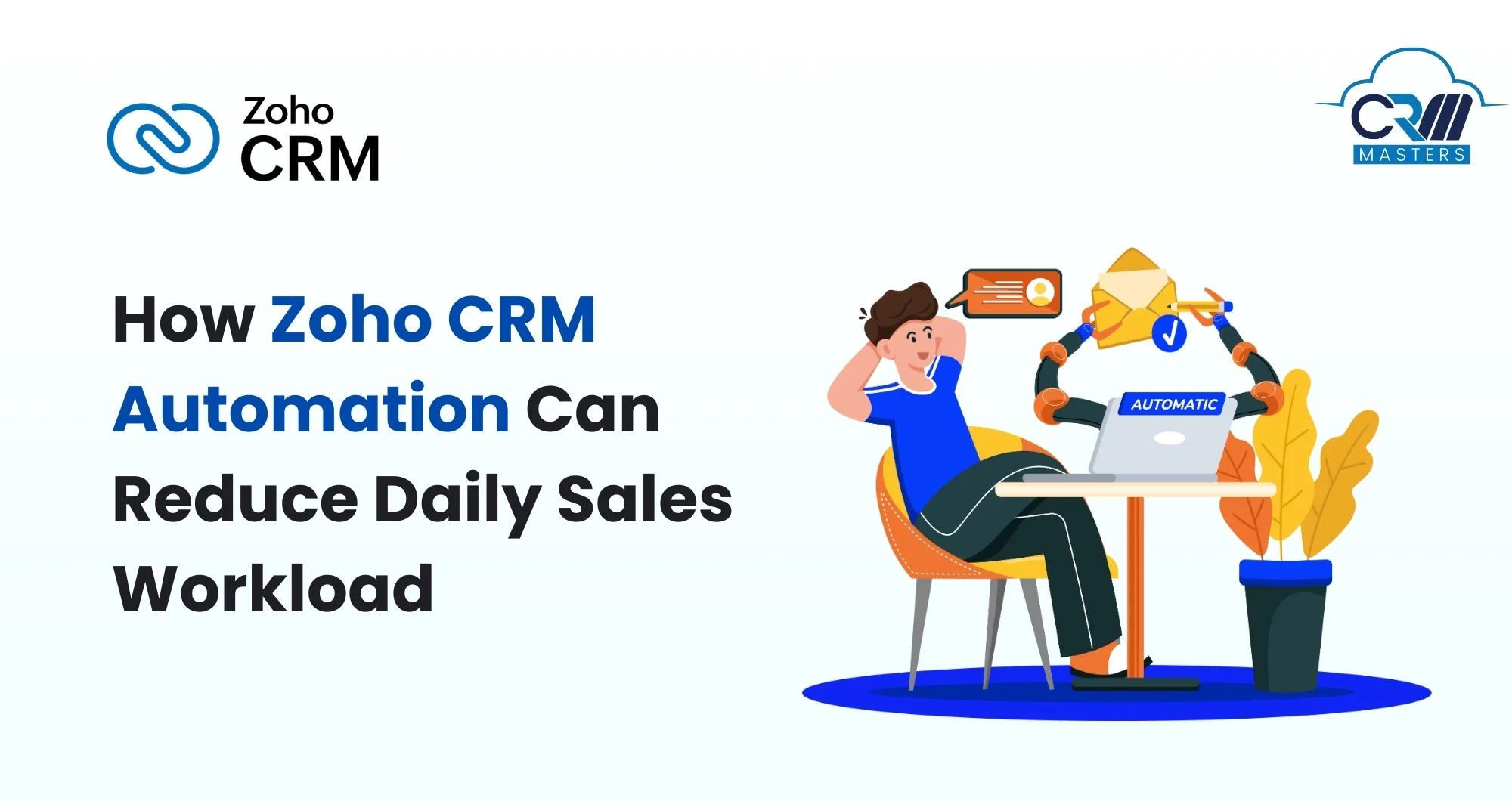
How Zoho CRM Automation Can Reduce Daily Sales Workload
Sales teams today handle more than conversations and follow-ups. They manage records, track emails, update deal stages, analyse performance, and switch between tools. Most of this work is necessary, but not all of it needs the human touch. This is where Zoho CRM Automation becomes a real advantage.
Automation in Zoho CRM is designed to remove repetitive work, enforce consistency, and give sales professionals breathing space to focus on actual selling. When deployed with the right structure, it becomes a silent assistant that never forgets tasks, never delays an update, and never lets a follow-up slip through the cracks.
This blog explains how Zoho CRM Automation supports sales teams, why it is useful, and how you can make the most of it in your own organisation. You will also find practical tips, important features, and a clear understanding of how automation fits into modern sales operations.
Why is Automation Necessary?

A typical sales day involves numerous small actions. On their own, these tasks look simple, but together they consume several hours every week.
- Common examples include:
- Updating lead information
- Assigning follow-up tasks
- Sending reminder emails
- Moving deals to the next stage
- Recording call outcomes
- Notifying managers about important changes
Although each step seems manageable, manual handling increases the chances of errors, delays, and missed opportunities. As a result, sales teams lose momentum, and customers receive slower responses. Zoho CRM Automation aims to solve exactly this. It builds predictable processes that run reliably in the background while your team stays focused on conversations, meetings, and conversions.
How Zoho CRM Brings Structure to Sales Operations

Zoho CRM offers a wide range of automation tools that support the entire sales journey. Instead of relying on memory or scattered reminders, your team can follow consistent workflows built inside the system.
Here is how Zoho CRM sets a strong foundation for organised selling:
1. Automated Workflows for Everyday Tasks
Workflows help the CRM react to specific events. When something happens, such as a lead entering the system or a deal reaching a new stage, the CRM performs an action automatically.
These actions can include:
- Sending a welcome email
- Assigning a lead to the right salesperson
- Creating a follow-up task
- Updating a field
- Triggering a call to third-party applications
Because these activities run automatically, sales teams no longer have to worry about missing routine steps or repeating the same action multiple times.
2. Flexible Conditions for Real-World Scenarios
Zoho CRM allows for very detailed conditions that determine when automation should run. This means you can create rules tailored to your business environment:
- Lead source
- Deal amount
- Region
- Industry
- Stage in the pipeline
- Type of customer
The CRM performs the right action only when the condition is right, ensuring accuracy and avoiding unnecessary triggers.
3. Scheduled Actions for Perfect Timing
Some actions are not meant to happen instantly. For example, a follow-up email may need to be sent two days after a demo.
Zoho CRM Automation makes this possible:
- Delay notifications
- Schedule reminders
- Trigger future tasks
- Space out communication
Why Zoho CRM Automation Is a Game-Changer for Sales Teams

Automation is not just a tool for convenience. It directly impacts performance, response time, and customer satisfaction.
Here are some strong reasons why sales teams benefit from automated processes:
1. Faster Lead Handling
The time between receiving a lead and responding to it often decides whether you win the deal. Automation assigns new leads instantly, sends timely emails, and ensures nothing stays untouched in the pipeline.
2. Consistent Follow-Ups
Many sales teams lose deals simply because they forget to follow up. Automated reminders, tasks, and emails keep every prospect engaged at the right pace.
3. Standardised Process Across Teams
Automation ensures everyone follows the same procedure. This helps new employees learn faster and reduces confusion in growing teams.
4. Reduced Administrative Work
Zoho CRM Automation handles thousands of background tasks every day. Salespeople spend more time selling and less time updating data.
5. Fewer Errors and Missing Details
Because automation handles updates, corrections, and notifications, data quality improves significantly.
Key Zoho CRM Automation Features That Make a Difference

To understand how Zoho CRM supports sales automation, it helps to look at the features that power these workflows.
1. The Workflow Rule Builder
Zoho CRM includes an easy-to-use builder that lets you design automation without writing code. You decide:
- What event will trigger the rule
- What conditions must be met?
- What actions the CRM should take
This builder helps create simple or complex automations depending on your business needs.
2. Insight Reports for Tracking Performance
When your CRM runs automation throughout the day, you need visibility into what is happening. Insight reports help you understand:
- Which rules are working
- Which actions are failing
- What changes improved performance
- Where data inconsistencies exist
- These reports make automation transparent and measurable.
3. AI Support Through Zia
Zoho’s AI assistant, Zia, observes user activity and identifies repeated tasks. If the system notices that team members perform certain actions frequently, it suggests turning them into automated workflows.
Zia also watches for changes in workflow performance, alerting you when something needs attention.
4. External Actions Through Webhooks and Custom Functions
Business operations often require information to move between tools. Zoho CRM Automation supports this through:
- Webhooks
- Custom functions
- API-based triggers
These tools allow the CRM to connect with other apps. For example, you can trigger an SMS when a lead reaches a certain stage or send deal information to your accounting software automatically.
Practical Tips to Make the Most of Zoho CRM Automation
Automation works best when it reflects real sales behaviour. The goal is not to automate everything blindly, but to build a structure that supports team efficiency.
Here are practical, actionable tips to get the most out of Zoho CRM Automation:
Tip 1: Automate First Touchpoints
Every new lead should receive instant attention. Automate steps such as:
- Sending an introductory email
- Assigning the lead
- Creating the first follow-up task
- This ensures your lead engagement starts smoothly.
Tip 2: Use Conditions Wisely
Avoid creating automation that triggers too frequently. Use specific criteria such as region, product interest, or deal value so the CRM behaves intelligently.
Tip 3: Build Automated Follow-Up Sequences
Create a chain of reminders and emails that carry the lead through the sales funnel. Balanced automation improves conversions without overwhelming the customer.
Tip 4: Connect CRM With Essential Apps
If you rely on tools like WhatsApp, telephony, or accounting platforms, link them through webhooks or custom functions. This reduces switching between apps and centralises your workflow.
Tip 5: Review Workflow Reports Regularly
Automation is not something you set once and forget. Use insight reports to understand:
- What is improving
- Where bottlenecks exist
- What needs fine-tuning
This strengthens your sales process over time.
Tip 6: Use Zia’s Suggestions to Refine Processes
Zoho’s AI observations can reveal patterns your team may not notice. When Zia suggests an automation opportunity, evaluate it and turn it into a rule if it fits your workflow.
Other Helpful Areas Where Zoho CRM Automation Supports Sales Teams
While workflows are the heart of automation, the CRM also improves daily sales tasks in several other ways.
1. Automated Lead Scoring: The CRM can assign scores based on behaviour, industry, or engagement. This helps sales teams prioritise more promising leads.
2. Auto-Assignment Rules: If your team is growing, set rules that distribute leads evenly based on capacity, territory, or expertise.
3. Deal Stage Updates: When actions such as meetings or calls are completed, the CRM can move deals to the next stage to keep the pipeline updated.
4. Automated Notifications: This ensures quicker guidance and faster decisions. Instant notifications keep managers updated about:
- High-value deal activity
- New opportunities
- Customer objections
- Lost deals
Let Zoho CRM Automation Work While Your Team Sells
If you want personalised guidance to implement automation that fits your business, CRM Masters can help. We are a trusted Zoho Implementation Partner with 9+ years of experience building structured CRM ecosystems.
FAQ
Q1. Can CRM Masters help set up complex automation in Zoho CRM?
Ans. Yes. We design workflows, conditions, and integrations tailored to your sales structure so the automation fits the way your team actually works.
Q2. What support do you offer after the automation is live?
Ans. We monitor workflow performance, refine rules when needed, and help your team adjust processes as your sales cycle evolves.
Q3. Does Zoho CRM allow timed follow-ups without manual tracking?
Ans. It does. You can queue emails, reminders, and tasks for future dates to keep every lead moving at the right pace.
Q4. How well does Zoho CRM handle data exchange with other tools?
Ans. Through webhooks and custom functions, the CRM can pass information to apps like telephony, messaging, or accounting platforms without manual effort.












